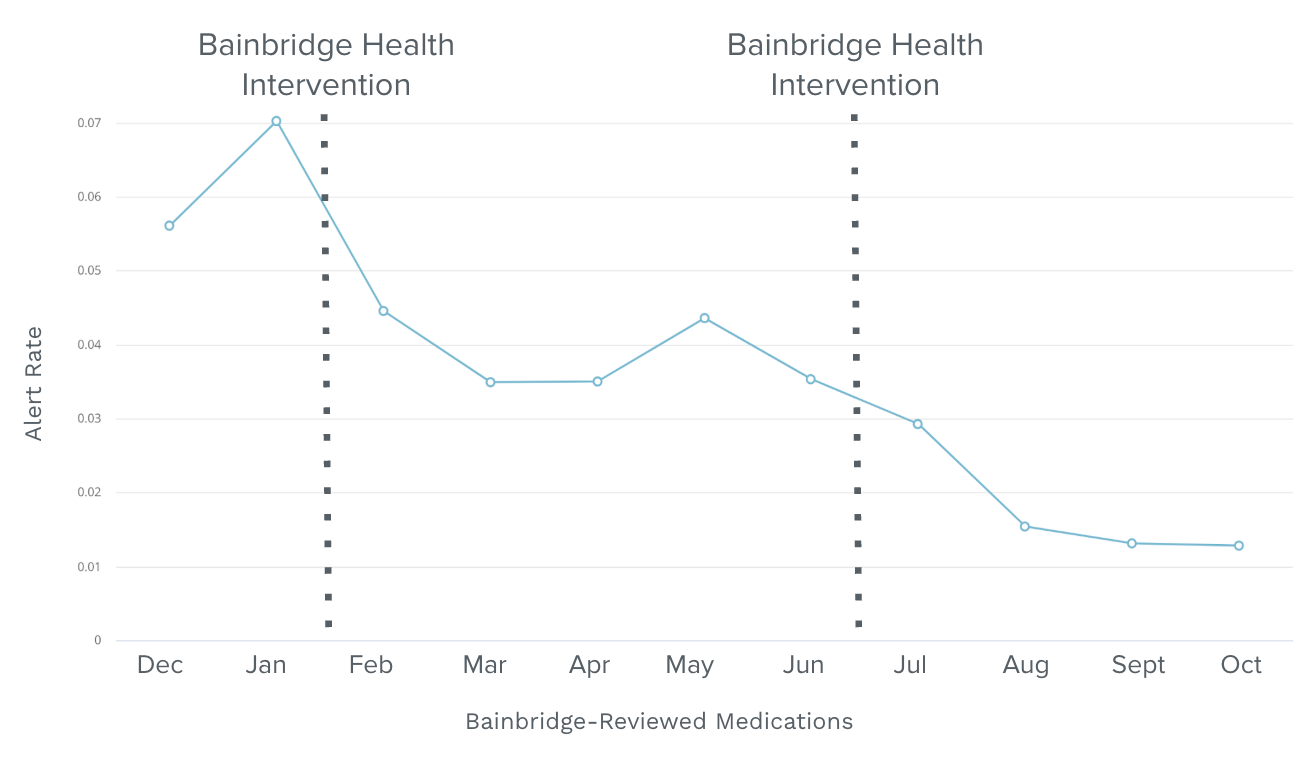
Med O.S.® for Infusion Safety Network Result
Bainbridge Health Helps a Five-Hospital System Reduce Clinically Irrelevant Alerts by 70%
Study Overview
Situation
A five-hospital health system established a goal to reduce clinically irrelevant infusion pump alerts (known as alert fatigue) in order to improve the nurse care environment and prevent medication errors.
Business Case & Findings
Alert fatigue is an established driver of medication errors and nursing burnout. Bainbridge Health identified a substantial number of alerts and overrides, exceeding network benchmarks.
Results
The health system decreased clinically irrelevant alerts by over 70%. For certain medications, clinically irrelevant alerts decreased by up to 94%.
Situation
A five-hospital health system established a goal to reduce clinically irrelevant infusion pump alerts (known as alert fatigue) in order to improve the nurse care environment and prevent medication errors. The health system partnered with Bainbridge Health after struggling to sustain a process to achieve its alert management goals. Bainbridge Health’s responsibilities were:
- Streamline infusion pump data aggregation and analysis for the pharmacy team
- Surface up actionable, high-impact, and evidence-based intervention opportunities to the Medication Safety team and P&T committees
- Provide bi-annual Clinical Impact Analyses (CIAs) summarizing the results of all interventions in order to monitor their efficacy
Business Case
- Alert fatigue is an established driver of medication errors and nursing burnout. Numerous regulatory bodies and thought leaders (including the ECRI Institute and The Joint Commission) cite alert fatigue as one of the most prevalent causes of harm in hospitals.1,2
- Medication errors can lead to patient harm and over $8,000 of avoidable cost per event. Nursing interruptions are associated with a 16.1x greater risk of harm.3,4
- Pharmacy leadership advocated that engaging Bainbridge Health would reduce the time investment from the Pharmacy and Medication Safety team to analyze data and truncate time to interventions.
Interventions & Impact
By leveraging its Med O.S.® platform, Bainbridge Health was able to detect, focus, and categorize interventions based on their value and implementation complexity in order to provide actionable interventions directly to the clinical team. The types of interventions identified ranged from broadening overly restrictive library thresholds, which contributed to alert fatigue experienced by bedside nursing teams, to identifying routine clinical indications for use and customizing dosing limits to support safe infusion administration. In addition, the Bainbridge Health clinical team completed an analysis of health system infusion programming patterns to more closely align existing library entries with actual administration practice.
Within the first year, Bainbridge Health was able to provide multiple quality improvement interventions that substantially reduced the health system’s primary goal of alert reduction. As a result, the health system decreased clinically irrelevant alerts by over 70%. For certain medications these alerts decreased by up to 94%, substantially reduced the alert fatigue experienced at the bedside.
Overall Reduction in Clinically Irrelevant Alerts

Figure: Clinical decision support salience at a 5-hospital system
Related Network Results

Optimizing Chemotherapy Decision Support to Reduce Bedside Interruptions by 85%

Optimizing Clinical Resource Allocation: Creating Efficiency Through Streamlining Infusion Data Analysis

Using Med O.S.® to Gain Visibility Into DERS Non-Compliant Infusions
Ready to Harness the Full Potential of Your Infusion Data?
Disclaimer
This example is for informational purposes only and should not be relied upon to make specific clinician decisions.
Clinical opportunities identified by Bainbridge Health were evidence-based according to supporting literature and network data. They were also made under the surveillance of the Bainbridge Health Clinical Solutions team, an interdisciplinary group of subject matter experts who provide guidance and oversight.
References
- The Joint Commission (TJC). Optimizing smart pump safety with DERS. TJC Sentinel Event Alert. 2021; 63.
- Institute for Safe Medication Practices (ISMP). Survey results: Smart pump data analytics. Acute Care ISMP Medication Safety Alert. 2018; 23(14).
- Institute of Medicine. Preventing medication errors. Washington, DC: The National Academies Press; 2007.
- Drews F, Markewitz B, Stoddard G, et al. Interruptions and the delivery of care in the intensive care unit. Human Factors. 2019; 61(4):564-576.